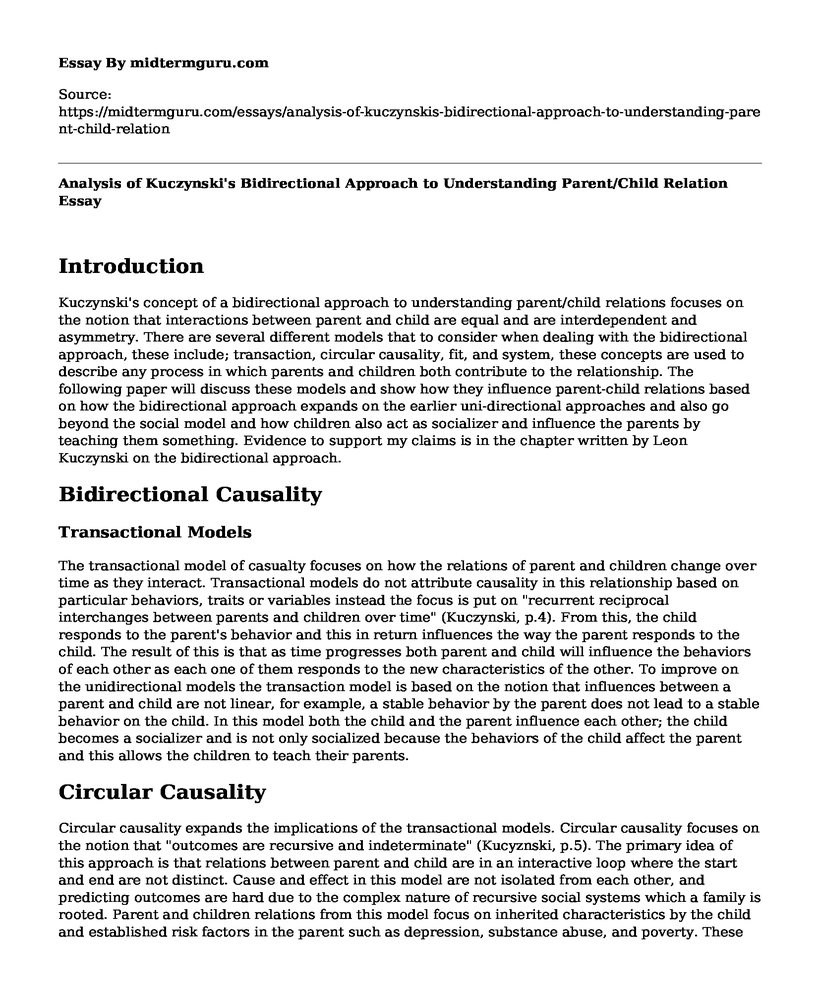Introduction
Kuczynski's concept of a bidirectional approach to understanding parent/child relations focuses on the notion that interactions between parent and child are equal and are interdependent and asymmetry. There are several different models that to consider when dealing with the bidirectional approach, these include; transaction, circular causality, fit, and system, these concepts are used to describe any process in which parents and children both contribute to the relationship. The following paper will discuss these models and show how they influence parent-child relations based on how the bidirectional approach expands on the earlier uni-directional approaches and also go beyond the social model and how children also act as socializer and influence the parents by teaching them something. Evidence to support my claims is in the chapter written by Leon Kuczynski on the bidirectional approach.
Bidirectional Causality
Transactional Models
The transactional model of casualty focuses on how the relations of parent and children change over time as they interact. Transactional models do not attribute causality in this relationship based on particular behaviors, traits or variables instead the focus is put on "recurrent reciprocal interchanges between parents and children over time" (Kuczynski, p.4). From this, the child responds to the parent's behavior and this in return influences the way the parent responds to the child. The result of this is that as time progresses both parent and child will influence the behaviors of each other as each one of them responds to the new characteristics of the other. To improve on the unidirectional models the transaction model is based on the notion that influences between a parent and child are not linear, for example, a stable behavior by the parent does not lead to a stable behavior on the child. In this model both the child and the parent influence each other; the child becomes a socializer and is not only socialized because the behaviors of the child affect the parent and this allows the children to teach their parents.
Circular Causality
Circular causality expands the implications of the transactional models. Circular causality focuses on the notion that "outcomes are recursive and indeterminate" (Kucyznski, p.5). The primary idea of this approach is that relations between parent and child are in an interactive loop where the start and end are not distinct. Cause and effect in this model are not isolated from each other, and predicting outcomes are hard due to the complex nature of recursive social systems which a family is rooted. Parent and children relations from this model focus on inherited characteristics by the child and established risk factors in the parent such as depression, substance abuse, and poverty. These risk factors affect the way a parent handles the children's behaviors and in turn, can have adverse effects throughout the life of a child.
Fit and Co-Evolution
Fit and co-evolution model of the bidirectional model by Kuczynski focus on living arrangements particularly those that involve more extended periods of time. From this, the notion of a child becoming a socializer is touched upon. The environment in which a child is raised will affect their relationship with the parents, for example, "research on children of difficult temperament suggests that their successful social functioning derives from how well their personality is complemented or supported by the context in which they live in" (Kuczynski, p.6). The environment in which a child and parent are in affects the way they complement each other and how they fit together.
Systemic Causality
Systemic causality focuses on complex systems of reciprocal influences between children and parents with emphasis placed on the environment both inside the home and outside the home. The complex family relationship affect children in many ways, for example, the impact children have on marriages can be either positive or negative, issues such as marital conflicts tend to affect children negatively. Since interactions between parents and children evolve, past interactions tend to influence subsequent interactions this in turn influence the behaviors and emotions of both participants.
Conclusion
Kuczynski systemic approach to parent/child relations emphasizes the impact of past experiences and how these influence the present relationship. According to him the past experiences of these two leads to "relationship expectancies" (Kuczynski, p.8). The history of a parent and child will affect the way future interactions occur because predictions can be made on how a parent or child will act based on similar previous experiences. Since these interactions affect the future relations of children and parents, the bidirectional approach advocates for more research since the parent-child relationship continues long after the child-rearing years are over.
References
Kuczynski, Leon. (2003). Beyond Bidirectionality: Bilateral Conceptual Frameworks for Understanding Dynamics in Parent-Child Relations. In L. Kuczynski (Ed), Handbook of Dynamics in Parent/Child Relations (pp. 3-25). Thousand Oaks, CA: Sage Publishers.
Cite this page
Analysis of Kuczynski's Bidirectional Approach to Understanding Parent/Child Relation. (2022, Sep 21). Retrieved from https://midtermguru.com/essays/analysis-of-kuczynskis-bidirectional-approach-to-understanding-parent-child-relation
If you are the original author of this essay and no longer wish to have it published on the midtermguru.com website, please click below to request its removal:
- Learning a Language in the Environment by the Example of Rodriguez
- Essay on Online vs Traditional Classes
- Should Homework Be Abolished in Public Schools? - Essay Sample
- Quality of Life in Early Childhood: A Must-Know - Essay Sample
- 2-7 Year Olds: Preoperational Cognitive Development - Essay Sample
- Paper Example on Adoption in LGBT Families
- Essay Sample on Developing the Spirit of Football among College Students







